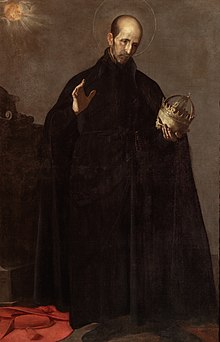Francisco Borgia
| Saint Francis Borgia | |
|---|---|
 |
|
| Confessor | |
| Born |
28 October 1510 Duchy of Gandía, Kingdom of Valencia, Spain |
| Died | 30 September 1572 (aged 61) Rome, Papal States |
| Venerated in | Roman Catholic Church |
| Beatified | 23 November 1624, Madrid, Kingdom of Spain by Pope Urban VIII |
| Canonized | 20 June 1670, Rome by Pope Clement X |
| Major shrine | Relics translated to Jesuit church in Madrid, 1901 |
| Feast | 30 September 10 October (General Roman Calendar 1688-1969) |
| Attributes | Skull crowned with an emperor's diadem |
| Patronage | against earthquakes; Portugal; Gandía; Rota, Marianas |
Saint Francis Borgia, S.J., 4th Duke of Gandía (Valencian: Francesc de Borja, Spanish: Francisco de Borja) (28 October 1510 – 30 September 1572) was a great-grandson of Pope Alexander VI, a Grandee of Spain, a Spanish Jesuit, and third Superior General of the Society of Jesus. He was canonized on 20 June 1670 by Pope Clement X.
He was born in Duchy of Gandía, Valencia, on 28 October 1510. His father was Juan Borgia, 3rd Duke of Gandía, the son of Giovanni Borgia, the son of Pope Alexander VI (Rodrigo Borgia). His mother was Juana, daughter of Alonso de Aragón, Archbishop of Zaragoza, who, in turn, was the illegitimate son of King Ferdinand II of Aragon. His brother, Tomás de Borja y Castro, also became a clergyman, becoming the Bishop of Málaga, and later the Archbishop of Zaragoza.
Although as a child he was very pious and wished to become a monk, his family sent him instead to the court of Charles V, Holy Roman Emperor (who was also King Charles I of Spain), where he was welcomed as a kinsman. He distinguished himself there, accompanying the Emperor on several campaigns.
...
Wikipedia
